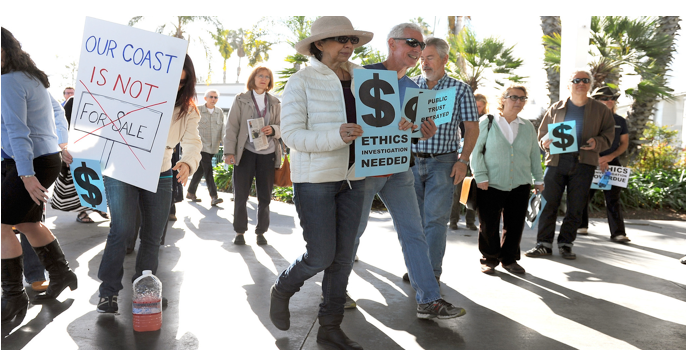CommentsCONNECTING CALIFORNIA--Members of state commissions are dumb enough when they talk to people. Keeping them apart from conversations won’t make them any smarter.
That basic insight is why efforts to “reform” the Coastal Commission and various other commissions don’t make much sense. The idea should be to encourage more conversation—public conversation—from which commissioners and everyone else can learn. And legislation shouldn’t pick and choose—making conversations with some people permissible, and conversations with other people impermissible.
So discard any reform that limits conversations. And adopt simpler reforms that encourage more conversation.
What does that mean in practice? It means adopting two categories.
If there’s a conversation between a commissioner and anyone whose work involves talking to commissioners, then that conversation needs to be disclosed the very day it happens. Not just the fact of the conversation, but some details – the subjects covered, the amount of time, the location. And that disclosure must come from both sides – the commissioner and the people approaching the commissioner. If people take notes, they should share their notes.
The teeth of the matter is this: if there are private conversations that go undisclosed, those are illegal—and both commission members and the lobbyist or lawyer involved in the conversation should be subject to fines and other penalties.
Such rapidly disclosed conversations should be the norm—and the only path to conversation. There can’t be another secret path, or some exemption, or some way to go off-the-record. If you don’t want to have a public conversation with commission members, great, but the world gets to know about it.
Otherwise, the only other path is to go to a meeting and talk to the commission in public.
Of course, three minutes at the microphone isn’t a great way to have conversations. If people want to throw energy into reform in this area, they should devise new kinds of public meetings ( there are many people that have thought about such things) that allows for real conversations, not just speaking. There are many models for such things, all of which drive lawyers for commissions crazy.
Which is another good argument for approaching this problem differently.
(Joe Mathews writes Connecting California and is an editor for Zocalo Public Square.This column was posted most recently at Fox and Hounds.)
-cw
Sidebar
Our mission is to promote and facilitate civic engagement and neighborhood empowerment, and to hold area government and its politicians accountable.

 CityWatch Los Angeles
Politics. Perspective. Participation.
CityWatch Los Angeles
Politics. Perspective. Participation.
28
Sat, Mar














